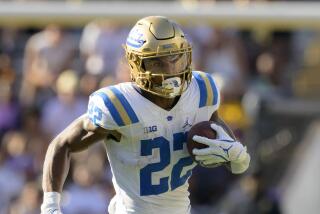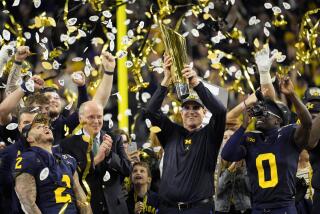Grain Elevator
- Share via
DUSTY, Wash. — The town of Dusty isn’t much to see, a patchwork of wheat and barley fields and a few grain elevators set amid shallow hills. Off the highway stands a cafe where farmers gather around noon.
They sit at a table in back, guys named Wally and Butch and Rooster, dressed in overalls, pouring themselves coffee and ordering the lunch special. The conversation soon turns to football.
“Most of the local farmers are Washington State alumni,” said Dean Hall, who works at the farm cooperative across the street. “Everybody talks about the Cougars.”
And when that happens, they inevitably talk about quarterback Jason Gesser.
Fans in Dusty and other rural communities around the university are partial to Gesser because he has led their team into the Rose Bowl against Oklahoma on New Year’s Day.
This is the second bowl appearance in as many seasons for Washington State, a long-time doormat that now has a No. 7 ranking and newfound respect.
But winning isn’t the only reason for Gesser’s popularity.
This Honolulu kid who arrived here a fish out of water has become a local favorite because of the way he plays.
The flip-flops and shorts, the island accent that still marks his words -- none of that matters. He has succeeded on unfamiliar terrain because of an attitude that makes perfect sense here.
The Competitor
Listen to stories of his youth.
Like the time Gesser was four or five years old and his mother Janet signed him up for youth soccer. She noticed him frowning as he ran around the field.
“Are you having fun?” she asked.
He snapped back: “No, we’re losing.”
Or the high school banquet when his basketball coach told the audience: “If Jason was playing jacks with my little daughter and she was beating him, he would cheat to win.”
St. Louis High never lost a game he started at quarterback, rolling to consecutive Hawaii state championships.
“He’s a tough kid,” said Cal Lee, his football coach there. “He could have been a linebacker. That’s the mentality of his football.”
It was 1998 and Washington State was still glowing from its first trip to the Rose Bowl in 67 years.
Gesser liked Coach Mike Price and the Cougar heritage -- the school had produced Drew Bledsoe, Mark Rypien and Ryan Leaf. He liked the idea of winning.
But it would not be so easy.
His first season, while he stood on the sideline as a redshirt, the Cougars staggered to a 3-8 record. In 1999, he battled a thumb injury and played only a few games as they went 3-9.
Gesser kept his mouth shut, listened and watched.
“One thing I noticed, nobody stepped up to say, ‘Hey, that was my fault,’ ” he said. “I knew I would have to be that guy.”
Since becoming the starter in 2000, he has assumed complete responsibility.
If a pass is dropped, well, he should have thrown it better. If the team loses, it is all his fault. When summer comes around, he leads the team in voluntary workouts.
“He brought this group together,” Price said. “I’d like to take the credit, but he’s the one.”
The Warrior
Teammates began to notice it during his freshman season when he struggled with that thumb injury. Gesser lied to coaches about feeling better so he could get back in the game.
Last season, he fractured his throwing hand but told no one until after he had guided the Cougars to a 33-27 victory over Purdue in the Sun Bowl.
“Keep him off the field?” receiver Collin Henderson said. “You’d have to shoot him or kill him.”
This fall, Gesser played with a dislocated rib and was knocked out of the Washington game with a badly injured right ankle and knee. Two weeks later, he returned with his leg wrapped and braced for a must-win game against UCLA.
His statistics weren’t much that day, but the other players took note.
“His toughness motivates us,” linebacker Mawuli Davis said. “That’s how he leads us.”
The Cougars have needed that moxie more than ever since Price’s surprise announcement that he is leaving Washington State to coach at Alabama.
Several players, including Gesser, reacted with anger and disappointment at first. The quarterback has quickly put his hurt behind him.
“I’ll think about it later,” he said. “After the game is over.”
The Nice Guy
Price explained it this way: “If you drop a pass in practice, he’ll get on you. But if you need a place to stay, you can stay at his house.”
As much as anything, this facet of Gesser’s personality drew him to Washington State.
He wanted a place where people say hello when they meet on the street. “Just like Hawaii,” he said. “You don’t walk past people without talking.”
He wanted a college environment where fans come to the stadium early in their motor homes and the whole town shuts down at kickoff.
“Forget those big-city schools,” he said. “You don’t get that closeness. You don’t get that sense of pride.”
Last summer, university administrators arranged a tongue-in-cheek publicity stunt, plastering a giant poster of Gesser on one of the grain elevators in Dusty. He was reluctant to agree, but did not hesitate to visit the town for the unveiling.
“I mean, the fans out there ... those are real fans,” he said.
The admiration was mutual.
“We had a pretty good turnout that day,” Hall said at the cooperative. “He came out and shook people’s hands. We thought it was pretty neat.”
Hometown Hero
Oklahoma defensive coordinator Mike Stoops can see it when he watches game films.
“Gesser is a winner,” Stoops said. “He does the things that a leader is supposed to do.”
Price can see it when he sidles up to his quarterback on those evenings past October, the wind blowing cold, the team practicing without benefit of an opponent or cheering crowd to warm the blood.
“Why’d you come here?” the coach teases. “Are you stupid?”
Gesser just smiles.
Eastern Washington has been a perfect fit for this young man. And vice versa.
Read the e-mail that comes into the Washington State athletic department. It’s not just the gaudy passing numbers or the Rose Bowl that prompts fans to write. They praise Gesser for his grit, his blue-collar approach.
The sort of attitude that makes perfect sense in a place where people work for a living.
Gesser knew it all along.
“The first time I came here,” he said, “I just thought this was the place for me.”
More to Read
Go beyond the scoreboard
Get the latest on L.A.'s teams in the daily Sports Report newsletter.
You may occasionally receive promotional content from the Los Angeles Times.











